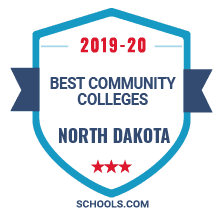CTE in North Dakota
Career technical education, or CTE, is a novel approach to high school and college instruction that combines academic education with practical, career-ready skill training. CTE programs in North Dakota have been having a powerful effect on student success, with the state reporting a high school graduation rate of 96 percent for students who concentrate their studies in CTE subjects.
Post-college achievement for graduates of career technical education programs has a similarly bright outlook. No less than 98 percent of students who go on to earn an associate degree, certificate or other CTE credential in North Dakota found employment, and apprenticeship or began military service within six months of finishing their training.
Take a look at these in-state resources for more information about the CTE landscape in North Dakota and ways to make your own education more affordable:
- The State of North Dakota's career and technical education site features a wide array of CTE information for students, parents, educators and business and industry leaders.
- The North Dakota Department of Public Instruction administers a career and technical education scholarship of $750 per semester or $500 per quarter that students can apply for in their senior year of high school.
- A program called ND Career Builders, created by the North Dakota Legislative Assembly in 2019, provides scholarships and loan repayment for CTE students in high-need and emerging occupational fields.
Two-year schools overseen by the North Dakota University System are the primary source of CTE training in North Dakota, although a few tribal colleges and special-purpose private institutions also offer a selection of degree and certificate programs. All four of the schools on our list of the top community colleges in North Dakota are members of the NDUS, so be sure to look over their catalogs thoroughly and meet with advisors to learn about your options.
Transferring Credits in North Dakota
If you've got your sights set on a four-year degree, it's important to be aware of the initiatives and resources that can help make your transfer journey go as smoothly as possible. The main tool used for seamless transfer in North Dakota is the transfer agreement — also known as an articulation agreement — which provides clear pathways between community college programs and North Dakota universities.
Every one of our best North Dakota community colleges has some sort of transfer agreement in place, with most requiring a particular area of study and a set group of lower-division courses. If you're planning to make use of one of these agreements when you transfer to a four-year school, make sure to let your advisers know as soon as possible so they can help you build a schedule that moves you effectively toward your goal.
Transfer scholarships can also be a big help in making the move to a university program. The University of North Dakota offers automatic scholarships to high-achieving eligible transfer students, for one, and more than 1,000 transfer scholarships are typically available statewide.
For more insight into potential destination schools in the state, read about the top four-year schools in North Dakota. Check out our college transfer guide for additional info about transfer agreements and tips to help you make a successful transfer.
Resources for Community College Students in North Dakota
- The North Dakota University System can give you an introduction to its four- and two-year schools, an overview of student life in the state and some tips to keep in mind when applying for college aid.
- RUReady, an education and career planning initiative of the North Dakota Career Resource Network, can help you plan your way through college and into the workforce.
- The Workforce Development Division of the North Dakota Department of Commerce can teach you about the state's job market and help you on your career search after graduation.
Methodology
Using the National Center for Education Statistics' Integrated Postsecondary Education Data System (IPEDS), we generated a list of colleges and universities that met the following criteria:
- Level of institution is either "At least 2 but less than 4 years" or "Less than 2 years (below associate)"
- Data is reported for all 14 ranking variables listed in the Methodology section
We ranked the resulting community colleges member schools on multiple factors related to educational opportunity, student performance and student services. Each school was scored on a 10-point scale, using the following data points:
- The published in-district tuition and fees, National Center for Education Statistics, 2018
- The published in-state tuition and fees, National Center for Education Statistics, 2018
- The in-district per credit hour charge for part-time undergraduates, National Center for Education Statistics, 2018
- The in-state per credit hour charge for part-time undergraduates, National Center for Education Statistics, 2018
- Percentage of students receiving financial aid, National Center for Education Statistics, 2016
- Percent of students that transferred to a 4-year institution and completed within 8 years, College Scorecard, 2017
- The graduation rate in 150% time, National Center for Education Statistics, 2017
- Full-time student retention rate, National Center for Education Statistics, Fall 2017
- Student-to-faculty ratio, National Center for Education Statistics, Fall 2017
- Percentage of students enrolled in distance education, National Center for Education Statistics, 2017
- Flexibility, based on the following data points from the National Center for Education Statistics, 2018
- Whether the school offers credit for life experiences
- Whether the school offers programs of study that can be completed entirely in the evenings and on weekends
- Whether the school offers on-campus day care for students' children
- Whether the school offers any kind of alternative tuition plan. These may include, but aren't limited to, payment plans or guaranteed rates.
